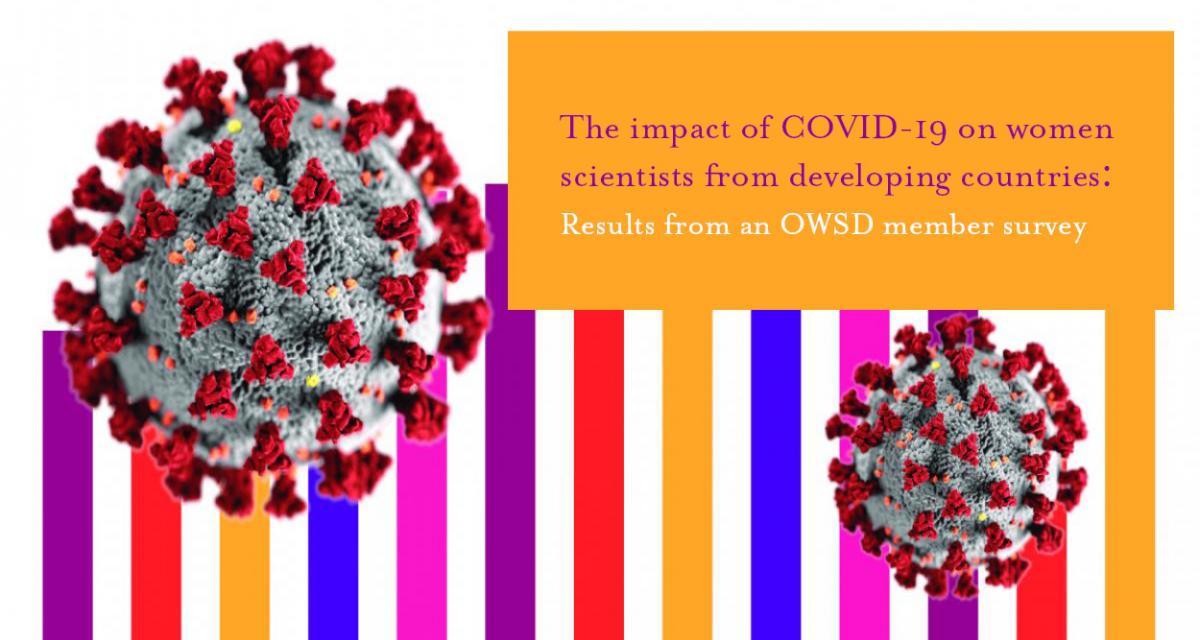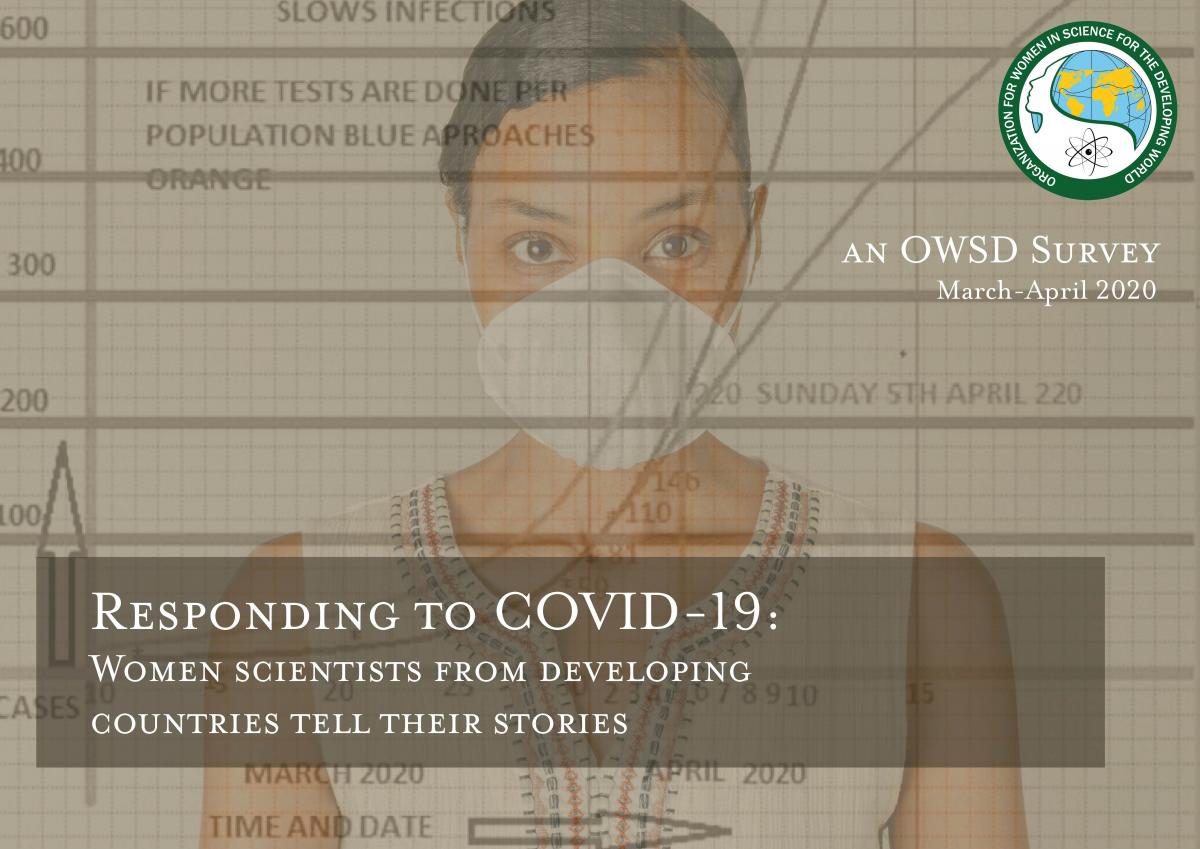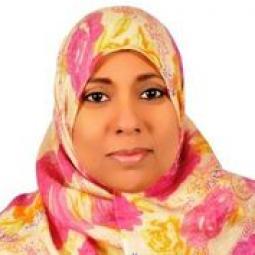OWSD and COVID-19
Please note that during the COVID-19 crisis, the OWSD Secretariat is working from home and continues to provide support to our fellows and members. We do not anticipate any disruptions to our programme support at this time.
As the COVID-19 pandemic unfolds, you can find all content related to the pandemic here on this page.
The impact of COVID-19 on women scientists from developing countries: Results from an OWSD member survey
 The impacts of the COVID-19 pandemic have been felt by scientists and scholars worldwide, as universities and industries have closed their campuses and standard funding and publishing pipelines have slowed down or shifted priorities. These impacts, however, are not felt equally by everyone; both institutions and individuals in developing countries often have fewer resources to support remote learning and working, and women often have different responsibilities that make working from home a bigger challenge than for men.
The impacts of the COVID-19 pandemic have been felt by scientists and scholars worldwide, as universities and industries have closed their campuses and standard funding and publishing pipelines have slowed down or shifted priorities. These impacts, however, are not felt equally by everyone; both institutions and individuals in developing countries often have fewer resources to support remote learning and working, and women often have different responsibilities that make working from home a bigger challenge than for men.
To get to the bottom of some of these differences and to understand the true impact of the pandemic on women scientists in developing countries, OWSD asked our network of members to tell us about how their work or studies, their family and home lives, and their mental wellbeing have been affected. The survey was conducted between June 16 and June 26, 2020. Some initial results from the survey are available now by clicking to the right; a full analysis will be published later.
Responding to COVID-19: Women scientists from developing countries tell their stories
 In late March, the Secretariat at OWSD asked our network of thousands of woman scientists living and working in developing countries to tell us in their own words how they, their research and their countries have been affected by the COVID-19 pandemic.
In late March, the Secretariat at OWSD asked our network of thousands of woman scientists living and working in developing countries to tell us in their own words how they, their research and their countries have been affected by the COVID-19 pandemic.
Their stories are collected in the document here. While sobering, these stories also inspire hope: from a Sudanese molecular biologist who is leading an initiative to make ventilators using 3D printers, to a Sri Lankan biochemistry professor who has volunteered her lab for diagnostic testing, to the professors in a Palestinian university who organized a special course on COVID-19 to teach students the principles of epidemiology, OWSD members are applying their knowledge and skills to helping their countries, and the world, rise to this challenge.
Read their stories by downloading below or clicking the image to the right.
OWSD Executive Board share their experiences
- OWSD President Jennifer Thomson (South Africa): "It is essential that the special role played by women scientists be understood and embraced."
- OWSD Executive Board member Huda Basaleem (Yemen): "The disease poses a uniquely high risk for Yemen."
- OWSD Vice President Jana Rodríguez Hertz (Uruguay/China): "Mathematics is important to provide models that can show the spread of the disease."
- OWSD Vice President Atya Kapley (India): "Our institute is now getting ready to be a detection center for COVID-19 and the different labs of CSIR are working on many aspects to deal with the pandemic."
- OWSD Executive Board member Hasin Anupama Azhari (Bangladesh): "This will certainly not be the only global health crisis, and the emergency management of health without borders needs to be considered."
OWSD Early Career Fellows write about impacts of COVID-19
OWSD Early Career Fellows have written in both scientific publications and in national and regional news outlets about the effects of the pandemic on the economies and particularly on food security in their countries:
- Hemu Kafle (Nepal), "What to eat after a pandemic?", in Naya Patrika Daily. [English translation]
- Sebelwork Mekonen (Ethiopia) and co-authors, "Knowledge, perceptions and preventive practices towards COVID-19 early in the outbreak among Jimma university medical center visitors, Southwest Ethiopia", in PLoS ONE.
- Shobha Poudel (Nepal), "Hunger looms as the economy stops", in the Kathmandu Post.
- Mashura Shammi (Bangladesh) and co-authors, "COVID-19 pandemic, socioeconomic crisis and human stress in resource-limited settings: A case from Bangladesh" in Heliyon.
- Mashura Shammi (Bangladesh) and Md Bodrud-Doza, "Lockdown: To withdraw or not to withdraw?" in The Business Standard.
- Mashura Shammi (Bangladesh), Md Bodrud-Doza and Md Mostafizur Rahman, "The potential risks of climate vulnerability and dengue amid Covid-19" in The Business Standard.
COVID-19 Risk Assessment and Communication tool developed by Early Career Fellow Shobha Poudel
OWSD Early Career Fellow Shobha Poudel and colleagues in Nepal developed a Risk Assessment and Communication tool (COVIRA) to help people easily understand their personal and regional risk of COVID-19. The tool is the first and only one of its kind that was developed with a multidisciplinary approach, applying scientific modeling that incorporates global as well as regional and local context. Shobha and the other researchers hope that the new tool can be applied internationally. A preprint of the paper describing the new tool is available here.
Letter to fellow scientists from OWSD Jordan National Chapter Chair Rana Dajani
The Chair of OWSD's Jordan National Chapter, molecular biologist Rana Dajani, penned an open letter to scientists worldwide, calling for them to view the changes imposed by the COVID-19 pandemic as an opportunity to reassess priorities and think about solutions. "The frameshift we need is finally here," she says. "Seize it."
Read the full letter here.
OWSD member Blessing A. Odogwu talks about incorporating gender into COVID-19 responses with SciDev.Net
In April, OWSD Member Blessing A. Odogwu was invited by SciDev.Net to be part of a panel debate titled ‘Should gender analysis be embedded in epidemic responses?’ Policy responses often fail to consider how gender and epidemics interact, and health policies that fail to recognize the different needs of genders cannot effectively mitigate the impacts of pandemics, such as the novel coronavirus. Along with panelists Sarah Hawkes (University College London/Global Health 50/50), Roopa Dhatt (Women in Global Health), and Giampiero Favato (Kingston University London, PLoS ONE), Blessing debated why gender analysis must be central in global health emergencies. A recap of her experience on the panel can be read here. The full panel discussion can be viewed here.











































